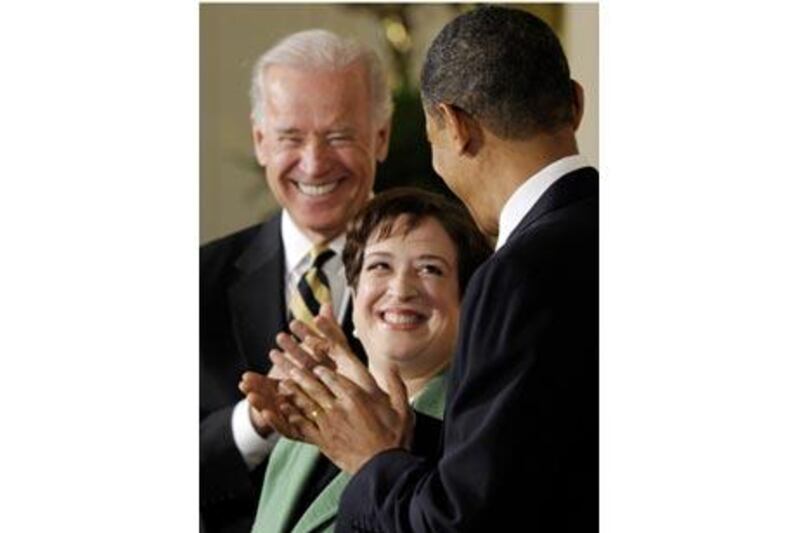The US president, Barack Obama, nominated the nation's top litigator a former dean of the Harvard Law Schoo,l to be the next Supreme Court justice yesterday, a move that has some Republicans questioning the nominee's judiciary experience. Elena Kagan, who has never served as a judge, is the US solicitor general, whose office supervises and conducts government legal action in the Supreme Court. She would take the seat of Justice John Paul Stevens, who will retire next month.
"I have selected a nominee who I believe embodies ... excellence, independence, integrity and passion for the law, and who can ultimately provide that same kind of leadership on the court - our solicitor general and my friend, Elena Kagan," Mr Obama said at the White House. The nine-member court has a huge influence over the daily life of Americans, and any justice can cast the deciding vote on matters of life and death, individual freedoms and government power.
Patrick Leahy, the Democratic senator from Vermont who is the chairman of the Senate Judiciary Committee, said he expects to have Ms Kagan confirmed by August. Even before her nomination, critics of Ms Kagan attacked her lack of judicial experience. If she is confirmed, she will be the first justice since 1972 when Richard Nixon nominated William Rehnquist and Lewis Powell to join the court without having served as a judge. That is likely to be an issue Republicans will harp on during the confirmation hearings.
Ms Kagan is a "surprising choice because she lacks judicial experience. Most Americans believe that prior judicial experience is a necessary credential for a Supreme Court justice", said John Cornyn, a Republican member of the Senate Judiciary Committee from Texas. Rick Pildes, the co-director of the Center on Law and Security at New York University, said while Ms Kagan has never officially presided over cases, her experience in other facets of law should not be discounted. "No one person is going to possess all of the necessary experiences that relate to the court," he said in a telephone interview from New York.
Ms Kagan, 50, would be the youngest justice on the court, and her appointment is unlikely to immediately impact the court's balance of power. The court was considered to have taken on a conservative bent when, in 2005, George W Bush chose the appeals court judge Samuel Alito to replace Sandra Day O'Connor, a moderate whose vote often made the difference in ideologically charged cases. Justice Stevens, who was considered the court's liberal leader, was often credited with being able to influence a swing vote. It was uncertain if Ms Kagan will be able to fill that role, despite a proven ability to reach out to opposing sides, Mr Pildes said.
"I don't think the president could have chosen someone with a more well-demonstrated track record of bringing the sides together," he said. "But we have no way of knowing how that will translate to the Supreme Court, which has justices that have established views on issues." But, he said, Ms Kagan "would be a formidable presence in the court for the next 25 years with a particularly sharp legal mind and a powerful work ethic".
Ms Kagan was born to Jewish parents in New York and was raised in Manhattan's Upper West Side. She graduated from Princeton in 1981 with a bachelor's degree. She then went to England to study at Worcester College at Oxford, where she received her master's in 1983. In 1986, she graduated from Harvard University's law school. Ms Kagan started her career in law as a clerk in a federal appeals court in Washington. In 1987-88, she served as a law clerk to Thurgood Marshall, the first African-American to serve on the Supreme Court. She worked in the executive branch as an associate counsel for the former president Bill Clinton in 1995-1996 and later served as deputy assistant for domestic policy and deputy director of the Domestic Policy Council.
Ms Kagan returned to Harvard in 1999 as a visiting law professor, and in 2003 broke a gender barrier at the Ivy League school, becoming the first female dean of its law school. This is Mr Obama's second Supreme Court nomination - and second female candidate. The US president previously nominated Sonia Sotomayor, who took her seat on the bench in August 2009. If Ms Kagan is confirmed by the Senate, it will mark the first time the US has had three female justifies serving on the Supreme Court. She would be the third Jewish justice along with six Catholics.
With Justice Stevens's retirement, the court will have no Protestants, the most prevalent denomination in the US. @Email:iromboletti@thenational.ae * With reporting by the Associated Press and Agence France-Presse






